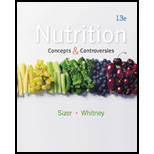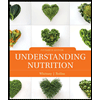
Nutrition: Concepts and Controversies
13th Edition
ISBN: 9781133603184
Author: Frances Sizer, Ellie Whitney
Publisher: Cengage Learning
expand_more
expand_more
format_list_bulleted
Concept explainers
Question
Chapter 1, Problem 4SC
Summary Introduction
Concept introduction:
In 2010, chartbook of health report included a
Expert Solution & Answer
Want to see the full answer?
Check out a sample textbook solution
Chapter 1 Solutions
Nutrition: Concepts and Controversies
Knowledge Booster
Learn more about
Need a deep-dive on the concept behind this application? Look no further. Learn more about this topic, health-nutrition and related others by exploring similar questions and additional content below.Similar questions
- To answer nutrition questions____________ a.rely on articles that include phrases such as "Now we know" or “The answer is," which appear to provide conclusive answers to nutrition questions b. look to science for answers, with the expectation that scientists will continually revise their understandings c.realize that problems in nutrition are probably too complex for consumers to understand d. a and carrow_forwardDiscuss why obesity is a growing epidemic.arrow_forward
Recommended textbooks for you
- Lifetime Physical Fitness & WellnessHealth & NutritionISBN:9781337677509Author:HOEGERPublisher:Cengage
 Understanding Nutrition (MindTap Course List)Health & NutritionISBN:9781337392693Author:Eleanor Noss Whitney, Sharon Rady RolfesPublisher:Cengage Learning
Understanding Nutrition (MindTap Course List)Health & NutritionISBN:9781337392693Author:Eleanor Noss Whitney, Sharon Rady RolfesPublisher:Cengage Learning  NutritionHealth & NutritionISBN:9781337906371Author:Sizer, Frances Sienkiewicz., WHITNEY, ElliePublisher:Cengage Learning,
NutritionHealth & NutritionISBN:9781337906371Author:Sizer, Frances Sienkiewicz., WHITNEY, ElliePublisher:Cengage Learning, Comprehensive Medical Assisting: Administrative a...NursingISBN:9781305964792Author:Wilburta Q. Lindh, Carol D. Tamparo, Barbara M. Dahl, Julie Morris, Cindy CorreaPublisher:Cengage Learning
Comprehensive Medical Assisting: Administrative a...NursingISBN:9781305964792Author:Wilburta Q. Lindh, Carol D. Tamparo, Barbara M. Dahl, Julie Morris, Cindy CorreaPublisher:Cengage Learning


Lifetime Physical Fitness & Wellness
Health & Nutrition
ISBN:9781337677509
Author:HOEGER
Publisher:Cengage

Understanding Nutrition (MindTap Course List)
Health & Nutrition
ISBN:9781337392693
Author:Eleanor Noss Whitney, Sharon Rady Rolfes
Publisher:Cengage Learning


Nutrition
Health & Nutrition
ISBN:9781337906371
Author:Sizer, Frances Sienkiewicz., WHITNEY, Ellie
Publisher:Cengage Learning,

Comprehensive Medical Assisting: Administrative a...
Nursing
ISBN:9781305964792
Author:Wilburta Q. Lindh, Carol D. Tamparo, Barbara M. Dahl, Julie Morris, Cindy Correa
Publisher:Cengage Learning